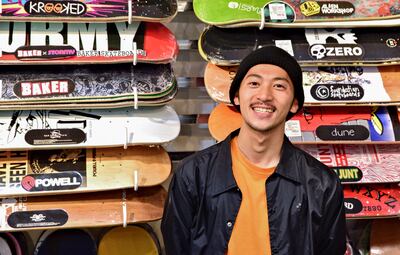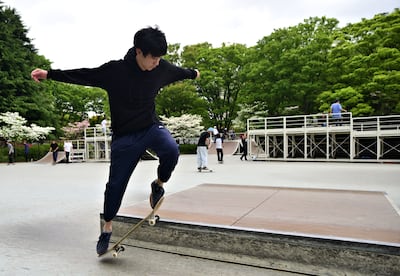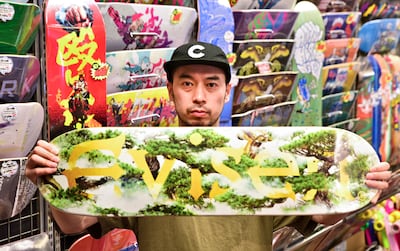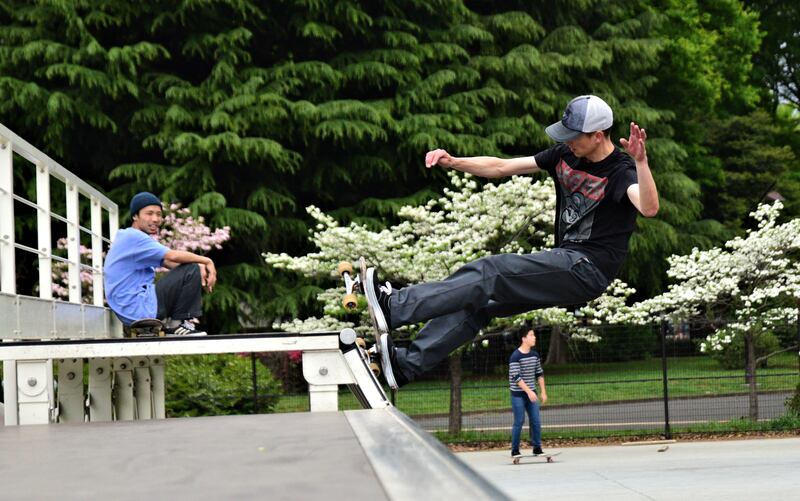To my left, a large group of teenage boys were transfixed by a wall of Spitfire wheels. To my right, two friends in their twenties were comparing the balance and flex of a Baker deck. And behind the counter at Stormy, the oldest skate shop in Tokyo, employee Shodai Baba was advising customers on skateboard components, from wheels and decks to trucks and bearings.
Skateboarding at the Olympics
When I visited the Japanese capital, prior to the coronavirus pandemic, I found the local skateboarding community was abuzz that the sport was making its belated Olympic debut in Tokyo in 2020. While Covid-19 has delayed the summer Olympics by a year, it hasn’t ruined skateboarding’s big moment. Some 62 years since the first skateboard was sold in its birthplace of California, skating is finally about to appear on the world’s largest sporting stage.
This is not only a seminal moment for the sport, but also for Tokyo’s skateboarding scene. The city has long had a large and passionate skating community, with the sport taking root in the early 1970s, when it was still an underground pastime even in the US.
In fact, Stormy is one of the world’s oldest skate shops outside of America, having opened 44 years ago.

Yet Tokyo has never taken off as a major skate tourism destination. Riders from around the world have for years flocked to cities such as Los Angeles, New York, Barcelona, Berlin and Sydney to conquer their streets and skateparks.
These locations became skate havens not only because of their large riding scenes, but also owing to gaining international exposure by regularly hosting major skateboarding events.
Now it is Tokyo’s turn. The global spotlight provided by the sport’s Olympic debut will boost the city's fame as a skating destination. Young riders in Spain, Canada, China, Germany and New Zealand will see their heroes competing for a gold medal in Tokyo and may then add that city to their skating bucket list.
All eyes on Yuto Horigome
Crucially, the sport will also be exposed to a far larger audience within Japan.
Skateboarding has never been strongly embraced by Japanese society. That is understandable given their cities are so orderly, clean and quiet, while skating can be noisy and chaotic and cause damage to public property that riders often use as apparatus – think benches, railings and staircases. Riding outside of designated skateparks is widely frowned upon in Japan, and is illegal in many public spaces.
By featuring in the Olympics, the hope is, skateboarding will appear more legitimate, Baba told me as we stood in Stormy, which was packed with customers, mostly young men and boys. This month, those same youthful shoppers will be able to watch one of their own countrymen try to put Japan on the skating map.
Yuto Horigome, 22, is the reigning world champion in the Street discipline and the face of Japanese skateboarding. His star is soaring at the perfect moment for Japan’s skating community, which has never before boasted a rider of his status.
Last month, he was responsible for a major upset at the Street Skateboarding World Championships in Rome, by winning the crown ahead of the most famous skateboarder on the planet, Nyjah Huston. That American legend has 4.6 million Instagram followers, a huge sponsorship deal with Nike and a reported net worth of $12 million.
If Horigome can edge out Huston for Japan's first skateboarding Olympic gold medal, it will vault him to superstardom. It could also make Tokyo the world’s hottest new skate tourism destination.
Skateboarding in Japan
When Japan’s first skateboarders took up the sport in the 1970s, there were no spaces designed for them. Instead they practised their skills on the street.

They rolled down alleys, kick-flipped over curbs and ground their boards along benches. When Stormy opened in 1977, this scene finally had a headquarters. Skaters from across the country would gather there to discuss the sport, swap tips and admire each other’s boards.
It wasn’t until the 1990s, however, that Tokyo’s riding scene emerged from obscurity. In that era, the sport went global, thanks to the boom in slickly produced skate videos, which showed America’s top riders unleashing their talents in cities across the US, Europe, Australia and, eventually, Japan.
When those US film crews went to Tokyo, they also captured footage of gifted local riders, and this exposure boosted the city’s international reputation, and also made the sport more popular locally. More and more Japanese children began buying boards. Skating was finally cool in Japan. And it still is.
The sport's influence is even visible in Tokyo fashion. It is common to see young Japanese men, in particular, wearing colourful T-shirts designed by skate brands such as Santa Cruz, DC and Element, or donning low-cut skate trainers by Nike SB or Vans.
When I set out to explore Tokyo’s board-riding community I was surprised by just how many skate shops and parks the city has. As I arrived at the enormous Komazawa Skatepark on a Saturday afternoon, I spotted more than 50 riders, ranging from children to men in their thirties. This facility in southern Tokyo is one of its three largest, along with Murasaki Sports Park in the city’s north and Maihama Skatepark in the east.
Stormy may be the spiritual home of Tokyo skating, but there are now more than a dozen other shops in the city that specialise in skateboarding products, shoes and apparel. There’s a cluster in Tokyo’s trendy, lively inner suburbs Shibuya and Harajuku.
A mere 250-metre walk north of Stormy, in Shibuya, I found Arktz, which was similarly crowded with young skate enthusiasts. It was in that shop that I interviewed one of the stalwarts of Tokyo’s skating scene, veteran rider and cameraman Yoju Mizusawa, 36.

Mizusawa, who began riding as a teenager, told me Street had always been the No 1 style of skating in Japan, and that made Horigome even more popular.
At the Tokyo Olympics, skateboarding will be separated into two categories – Park and Street. All skating events will be held at the new Ariake Urban Sports Park, a huge and impressive skating facility. Once the Olympics has finished, and the pandemic recedes, this skatepark is likely to become a magnet for riders from all over the world.
It has taken 50 years, but skateboarding is finally set to go mainstream in Japan.






